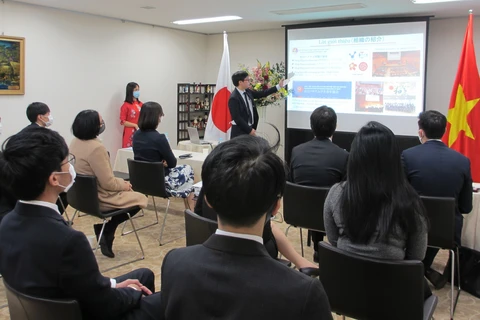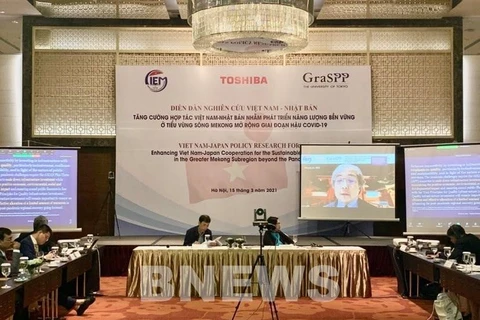The annual M-Tech Nagoya exhibition is the biggest of its kind in Japan, gathering a large number of businesses from the UK, France, Germany, the US, Japan, the Republic of Korea and China.
This is a good chance for Vietnamese firms to seek partnership opportunities, join the global value chains and access latest manufacturing technologies.
However, according to Vietnamese Trade Councilor in Japan Ta Minh Duc, this year, due to COVID-19 pandemic’s impact, many Vietnamese businesses have not able to attend the event. The Vietnamese Trade Office in Japan have supported them in introducing their products to partners.
Masaki Hatabe from Reed Exhibitions – the organiser of the event – said that the firm will organise three exhibitions this year and four next year. He said he hopes Vietnamese enterprises can join the events.
According to Japanese customs statistics, in 2020, Vietnam’s exports of support industry products to Japan reached 1.1 billion USD, accounting for 5 percent of the total export revenue of Vietnam to the market.
The Vietnamese Trade Office in Japan attributed the results to the Vietnamese and Japanese Government’s efforts in promoting partnerships among businesses of both sides.
In six priorities of the industrialisation strategy within the Vietnam-Japan cooperation framework, three are related to the support industry, including electronics, agricultural machinery, and automobile and automobile spare part production.
Alongside, the two sides have agreed to implement many measures to further boost the growth of Vietnam’s support industry, while strengthening personnel training in business management, and attracting more investment and exploring more markets to increase revenue and reduce cost.
Prime Minister Nguyen Xuan Phuc signed Resolution No.115 last year on measures to further propel supporting industries, setting out development goals for the next decade.
Vietnamese enterprises are to be able to produce highly-competitive support products, meeting 45 percent of essential needs for domestic production and consumption and accounting for about 11 percent of industrial production value by 2025.
About 1,000 enterprises are to be capable of direct supply to assembly enterprises and multinational corporations, with domestic enterprises to account for about 30 percent by 2025.
By 2030, support products will meet 70 percent of demand and account for about 14 percent of industrial production value. Some 2,000 companies are to be capable of supplying directly to assemblers and multinational corporations by 2030.
Vietnamese businesses operating in supporting industries have been developing in both quantity and quality in recent years, with improved production capacity and increasing engagement in global production chains.
In a recent report submitted to the National Assembly Standing Committee and legislators, the Government cited statistics showing that companies in supporting industries account for nearly 4.5 percent of all manufacturing and processing businesses and have created more than 600,000 jobs, equivalent to 8 percent of the workforce in the manufacturing and processing sector. Their net revenue now tops 900 trillion VND (38.9 billion USD), or about 11 percent of the sector’s total.
Some Vietnamese enterprises boast relatively good capacity in producing moulds, bicycle and motorbike components, electrical cables, plastic and rubber components, and tyres, meeting domestic demand and the requirements of foreign importers.
The report noted that supporting industries play a decisive role in restructuring the economy, improving workplace productivity and skills, and promoting the competitiveness and quality of Vietnamese goods and the economy./.

























